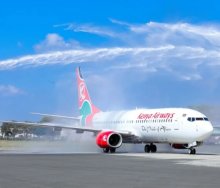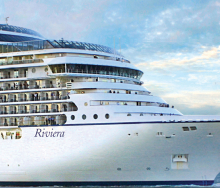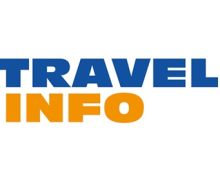True corporate management still in its infancy
LOCAL TMCs booking
travel into Africa and
seeking cross-border
partners may encounter
a frustrating lack of
specialisation in corporate
travel. Many travel agents
across the continent
continue to service a mix
of business and leisure
clientele, with inadequate
knowledge of the elements
deemed integral to corporate
travel management in larger
markets.
While not discounting
the existence of highly
professional global brand
TMCs outside South Africa,
Monique Swart, founder of
the African Business Travel
Association (Abta), says
true TMCs “are a drop in
the ocean”. The concept
of true travel management
– including duty of care,
data provision, technology
offerings and more, is in an
infancy stage for most, she
comments.
“Coupled with this,
local corporates in many
emerging regions do not yet
have a good understanding
of how to manage a
corporate travel programme,
with many not having travel
policies. So, a key element
needed – the push from
clients – for travel agents
to grow into TMCs, is often
not there.”
Sharon Nash, director:
Travel Operations for Club
Travel Corporate, says the
reality is that most of the
African markets are not
big enough to specialise.
While many of Club Travel’s
Globalstar partners in
Africa come with the
strength of familiarity with
their markets and have
established, on-the-ground
relationships, “the small
negative comes in with
challenges relating to
reporting, which is expected
by multinational corporate
clients”.
Travelport’s Guido Verweij,
regional md, Africa, also
says the size of the
business is much smaller
and is led by international
organisations or nongovernmental
organisations
that have large teams
on the continent. But
with the bleisure trend
growing, he sees the lack
of a business/leisure
differentiation as less of
an issue.
“A recent independent
global study commissioned
by Travelport found that
millennials’ escalating thirst
for bleisure – itineraries
combining both business
and leisure – is driving
change in booking and travel
habits. Over half (56%),
for example, now regularly
extend their business trips
by a few days to see local
attractions. To satisfy their
‘bleisure’ needs, most South
African millennial business
travellers are
now doing their own
research before finalising
their travel plans.”
Global Business Travel
Association (GBTA) board
member, Robyn Christie,
has a different view on the
lack of professional TMCs
overborder.
“Having recently spent some
time in Zambia with a leading
travel company, I have to say
this may be an opinion formed
by those who are not familiar
with the true workings within
the travel environment in Africa.
Travel companies have evolved to
meet the needs of their travelling
customers and, whilst the cookiecutter
approach may not work,
some of the TMCs have become
more resourceful than those in
more developed countries.
“Owing to the fact that in some
regions the choice of supplier
or even access to information
about destinations is less
accessible, it is very clear that
the relationship between the
traveller and the TMC is perhaps
a little more co-dependent. Unlike
in markets where broadband
and availability of choice are in
abundance, [corporates in] many
African countries rely on using
the services of a professional.
As such, TMCs operating in
Africa have had to evolve at a
fast pace and are keen adopters
of technology, particularly in the
distribution of content.”
However, it’s a numbers game,
says Robyn, and suppliers of more
sophisticated booking tools are
less likely to view opportunities in
some African countries with the
same enthusiasm as markets
that offer better infrastructure and
bigger volumes. “This means that
products we may have available in
a South African context are not yet
deployed in other countries, but
that doesn’t mean it won’t change
in the future.”
Robyn notes that multi-national
account programmes deployed
by large global accounts demand
that TMCs meet their standards.
Whilst they may not have the
sophisticated booking tool
functionality at the front-end, it is
expected that the required data is
collected, collated and uploaded
into the customer systems so that
the contribution of that customer’s
activities is incorporated into the
global spend.
“Within these countries there
is every chance that business
travellers also make up the
leisure travel market and for those
TMCs delivering great service
and managing good business
relationships, the likelihood of
that traveller booking elsewhere is
slim. The challenge, of course, is
that it is not common practice for
TMCs to differentiate business and
leisure passenger bookings, so the
blur is inevitable,” says Robyn.
Safety: views split on corporate attitudes
DO CORPORATES undertake sufficient
research on the risks in specific
African destinations before sending
their clients into the fray? Some
say awareness of the dangers has
increased but others feel the approach
remains somewhat cavalier.
“From a South African perspective,
I believe that we still have a long
way to go in relation to duty of care,
with our general ‘I’m sure we’ll be
fine’ attitude rising to the fore and
pushing travel risk management to
the bottom of the ‘to do’ list. Globally
mandated programmes generally are
far more focused on this element but,
in my opinion, your average African/
South African company does not place
much, if any, emphasis on this,” says
Monique Swart of Abta.
She says certain industries – such
as oil and gas and the banking
sectors – do better than others and
display a stronger interest in risk
management. “I believe this is an area
that will take a lot more education
in the coming years, with companies
truly understanding the cost as well
as various risk elements, including
reputational, of not effectively applying
duty-of-care principles to their staff
travel programmes.”
Monique recently attended an event
with some national corporates, where
avoiding putting a full management
team on one aircraft, due to business.
for travellers to get quality, up-to-date
information on their destinations
before setting out on a trip.”
Traveller awareness of safety has
spurred many corporate companies to
employ safety officers who travel to vet
the security and emergency procedures
at hotels, says Karin Sieberhagen,
sales and marketing manager – Africa,
of Serena Hotels, only permitting their
staff to stay at properties that meet
stipulated criteria.
African Sun sales and marketing
director, Tariro Ndebele, says, from
enquiries received, a heightened sense
of security is in play, attributable to
prior research. Further, the continent
is currently relatively safe. “To a
large extent, if we look at Southern
Africa, there are no ongoing conflicts,
something that could not be said two
decades back. Even as we move north,
there are fewer conflicts comparatively,
although of course any conflict is
cause for concern, so the ideal would
be total eradication. As a continent
we could do better, although there
has been a marked improvement in
communication and raising awareness
through the issuance of travel alerts.”
Research on safety varies from
company to company, says Kerry
Scrooby, office manager for XL Turners
Travel in Johannesburg. “Some
companies follow strict procedures
when they have employees travelling
in African countries, but in general the
corporates/travel bookers still rely on
us as agents to advise or alert them
on any health or safety issues and do
not research on their side. This is quite
risky when travel extends to remote
areas, beyond the port of entry that
is booked by the agent, and the agent
may not have been informed of this.”
“We should never underestimate
the infrastructure and resources
that these corporate companies
who send travellers into countries
in Africa have available to them,” is
the view of Robyn Christie. “They
are very well equipped and have a
network of providers that ensures their
passengers’ safety and security.
I think travellers into those areas
should also take responsibility to find
out the details of what resources and
support are available to them in the
event they need them.
Lifestyle diseases are a risk
continuity risks in the event of a plane
crash, was discussed. “Not one of
the 30 corporates in the room had
considered this risk, and even when
faced with it, the general response
was: ‘Yes, but how likely is that to
happen?’,” she says.
City Lodge Hotel Group spokesman,
Angus Macmillan, says there is
no doubt that travellers are more
aware than ever about conditions in
countries they are travelling to, thanks
to electronic news and social media.
“However, there is never room for
complacency. It is always advisable
DR ALBIE de Frey of The Travel
Doctor Corporate, says in two
decades of taking care of
corporate travellers, statistics
show that only about 2% require
medical assistance that leads to
hospitalisation abroad, medical
evacuation and repatriation.
The Travel Doctor is a guest
speaker this month at a series of
countrywide workshops hosted by
TIC, the insurer of a large majority of
South African business travellers.
“Whereas the headlines are ruled
by exotic tropical diseases [such
as ebola, dengue fever and the zika
virus], in reality, by far the majority
of travellers who fall ill and consult
us for itinerary-altering conditions
suffer from pre-existing medical
ailments, many of which could have
been avoided if taken care of prior
to departure,” says Albie.
The primary killer of corporate
travellers in developing countries
is, in fact, trauma such as traffic
and other accidents, notes Albie,
complicated by a lack of emergency
services such as ambulance
helicopters, which can make the
life or death difference. ‘Lifestyle
diseases’, such as uncontrolled
hypertension, ischaemic heart
disease and diabetes, come
second.
The most common tropical
disease affecting travellers is
malaria. Every malaria death is a
failure of medical care in some
form or another, he says, and in
the case of a corporate traveller,
there is a real medico-legal risk for
the company (malaria is a workrelated
disease in terms of the
Compensation for Occupational
Injuries and Diseases Act).
Other risks
Simmy Micheli, sales and marketing
manager of TIC, says 50% of SA
business travellers visit destinations
where malaria is found. The country
posing the largest malaria burden
in our region is Mozambique. TIC
provides unconditional cover for
tropical diseases.
Zika, says Albie, was discovered
in Tanzania, but the widely reported
birth defects in Oceania and South
America are not found in Africa and
are caused by a mutated form of
the virus. Ebola, he says, is a small
threat to regular business travellers,
unless they are in the healthcare
industry.
Simmy says manual labour injuries
are excluded from regular cover and
business travellers working on mine
and construction sites must select
the appropriate product. Relatively
minor injuries can become major
when orthopaedic services are
limited, and tetanus and lock-jaw
are complicating possibilities.”
City Lodge grows network
The City Lodge Hotel Group is rapidly extending its
network of hotels suitable for corporate travellers in
East and Southern Africa. This includes the 171-room
City Lodge Hotel at Two Rivers Mall in Nairobi, the
147-room City Lodge Hotel Dar es Salaam (above),
and the 148-room City Lodge Maputo. All three
hotels are expected to be fully operational by the
end of September. The group already has two hotels
in Nairobi and one each in Gaborone and Windhoek,
complementing its 54 hotels in South Africa.
WHEN Virgin Atlantic’s second
daily flight from Johannesburg
to London swings into
service on October 28 it
will not only add 180 000
seats to the route between
Africa and Europe, it will
also improve connections
between regional Africa and
the US West Coast. So says
Mandy Lerena, the airline’s
commercial manager.
She adds that the Flying
Co rewards programme
is tailored for small to
medium corporate clients.
Businesses that join will
earn Flying Co miles on all
aspects of business travel
– flights, hotel stays, foreign
exchange and more. These
can be exchanged for reward
flights, flight upgrades and
Clubhouse invitations.
“We also reward the
travellers themselves, as
they’ll earn their own Flying
Club miles in addition to
the miles earned for the
company,” she says.
Acceptance of card payments improves but cash remains king
FOREIGN exchange and
payment have long been
a challenge for corporates
doing business in Africa
– for their travellers, with
the lack of acceptance of
credit cards, and investors
who have difficulty getting
foreign currency out of certain
countries.
Travelport’s Guido Verweij
says: “The settlement of
airline charges by local
agencies can be difficult, as
credit cards are not widely
available or adopted, so
agencies cannot pass these
on to airlines. Instead, they
need to be able to accept
alternative payments such
as M-Pesa, the mobile wallet
in Kenya. “Kenya has led the
world in mobile-based payment
systems for a number of
years. It was the first country
where Travelport successfully
launched its new Travelport
Smartpoint plug-in to enable
travel agents in Kenya to
accept payment for travel
services via mobile devices
from travellers, using either
M-Pesa or Airtel money, as an
alternative method of payment
instead of cash or credit card.”
Hotels, too, frequently reject
credit cards. TNW asked some
local hotel groups prominent in
Africa about their policies.
“The City Lodge Hotel
Group's acceptance of credit
cards in Africa is determined
by the acquiring banks
available to us. Depending on
the country, we typically accept
all Visa and MasterCard cards,
with some of our operations
accepting Diners Club and/or
American Express,” said Angus
MacMillan, group spokesman
for City Lodge brands.
Serena Hotels, says Karin
Sieberhagen, accepts Visa and
MasterCard at its properties.
“To eliminate problems and
to assist travellers we have
a ZAR bank account for prepayment
of bookings, transfers
and other services. In the
Johannesburg office, we accept
all cards, including Diners Club
and American Express, which
might be a problem in Africa.”
Hara Jackson, corporate
business development
manager for Legacy Hotels,
recently told an Abta workshop
that, although credit card
usage was growing, it did
come with its challenges,
including fraud. She noted that
in some countries, such as
Ghana, cheques are still in use
for 10% of hotel payments.
In that country, just over 30%
of payments are on 30-day
accounts, 30% of corporates
do physical transfers at
banks, and other modes,
including cash, account for the
remaining 30%. In Nigeria, an
enormous amount of business
is through direct deposits and
cash, with a small number of
payments by credit cards.
PCI compliance, says XL
Turners Travel’s Kerry Scrooby,
has compounded the credit
card challenge, as a lot of
hotels still ask for copies
of cards. “Tour operators/
suppliers that have secure
payment links have made
agents’ life a lot easier.”
Says Robyn Christie of the
GBTA: “In those countries
where the local infrastructure
is lacking, one cannot expect
that the virtual card market
is the payment solution of
choice. But for the most part
in our surrounding countries –
Namibia, Botswana, Zimbabwe,
Zambia – credit cards are well
received in the cities and, of
course, at cash machines
where one can draw local
currency.”
This is confirmed by
Zimbabwe group, African Sun
Hotels. Tariro Ndebele says
all African Sun hotels accept
most internationally recognised
credit cards and payment
options. “We strive to make it
easy to do business with our
partners and are continually
researching how we can make
transactions easier for our
guests,” she says.
But cash still rules continentwide.
Abta’s Monique Swart
says: “We are seeing a
slow improvement in certain
emerging countries but for the
most part, cash is still king
in Africa. In many countries,
only the local currency may
be used. My advice would be
to do your homework, check
with suppliers what payment
options are accepted, and
limit cash transactions as
much as possible. Not only
are they more difficult to track
but carrying large quantities
of cash is also a safety risk to
travellers.
“When using cash, try to
determine as accurately as
possible the exact amount
that will be required during
the trip to reduce instances of
travellers returning home with
large amounts of forex that
they often cannot convert back
into rands, leading to wastage
for the company. These funds
can always go into a kitty and
be used on the next trip, but
sometimes large currency
fluctuations, can lead to a
loss,” she remarks.
Air, hotels and visas ease up
AFRICA has long had a bad
rap as a travel location,
the critics citing poor air
connections, expense, and
prohibitive entry regulations.
But there are positive signs
that all these factors are
easing up.
Travelport’s Guido Verweij,
who is well travelled on
the continent, is one of the
upbeat ones. “As a Dutch
national, I needed a visa to
almost every country I visited,
but almost all countries now
have an eVisa where one can
simply apply and pay online
beforehand. The process is
very clear and transparent.”
Abta’s Monique Swart
agrees that visa processes
have improved for certain
countries, but often these
relaxations are for tourist
and not business visas. “As
much as business travellers
might be tempted to enter a
country on a tourist visa, this
is not recommended as many
countries are clamping down,”
she points out.
On the subject of air
travel, Guido notes that the
first phase of the recently
instituted Single African Air
Transport Market will make
travel much easier and an
entrepreneurial spirit bodes
well for new routes and
frequencies in the sometimes
precarious African aviation
industry.
“It has seen many issues
in terms of the number of
airlines that have ceased
operations, but 283 African
airlines currently operate,
and 52 airlines are preparing
to start up,” he says. “The
substantial number of failed
airlines in a relatively small
market can create challenges,
but the constant supply of
start-ups presents many
opportunities as we engage
with the local markets
and sign up airlines to our
merchandising solutions as
soon as we can.” He also
notes significant growth in the
LCC sphere.
Club Travel Corporate’s
Sharon Nash feels that while
there is still much room
for improvement, there are
more flight options, and
inconvenient instances of
having to fly to Europe to
locate a connection to West
Africa, for example, happen
less often. Kerry Scrooby of
XL Travel agrees that airlines
have added new routes
and additional frequencies,
improving convenience, “but I
think the general perception
of unreliability still persists,”
she notes.
Robyn Christie of the GBTA
says unexplained delays and
technical issues really rile
travellers in Africa. Ground
staff are not always equipped
with information and some
airports can be a little chaotic
but “for the most part one
can get around with a degree
of ease”. “Travellers and
their bookers should make
informed choices. A further
night in a hotel may be more
palatable than trying to
take the last flight out of a
destination and then hearing
its ‘gone technical’.”
Ground travel, says Monique,
remains a challenge, with
many travellers not being
comfortable driving on local
roads. Hotel-operated and
secure transfers are the way
around this, she advises.
The hospitality sector is
improving, however, with
widening choice, even in
emerging markets, notes
Monique. “The price for
hotel accommodation is
still relatively high though,
in relation to South African
pricing, which has led to a fair
amount of companies utilising
corporate housing or B&B
options.”
Robyn, too, has seen
an increasing number of
hotels popping up in all the
cities, but not so in more
rural regions. There are few
platforms offering a directory
of up-to-date and relevant
hospitality content, she says.
“When sending travellers
into Africa, corporate travel
managers have to adopt a
far more strategic approach
in comparison to other
markets. Understanding the
destination, traffic delays
and local cultures is vital to
ensure that travellers have
productive trips with as little
downtime as possible,”
concludes Monique.
Convenient perks
ALL African Sun Hotels
feature dedicated business
centres and high-speed
Internet access, allowing
guests to log on with at
least two gadgets.
The group also maintains
a tranquil environment for
business travellers on its
executive floors and wings
by accommodating families
in other areas, where
possible.
Most hotels have
adequately resourced
fitness centres which are
open early in the morning
to cater for the early birds,
till early evening for those
who want to exercise ‘office
fatigue’ away. “Our meals
are also continuously
re-engineered to take into
account healthy options
and make these available
to our corporate travellers,”
says African Sun’s Tariro
Ndebele.
“Our loyalty programmes
top it all up, as we give
something back to the
guests in appreciation of
their business,” she says.
Travelport innovates
RECENTLY launched Travelport
Trip Assist provides agencies
with a fully branded mobile
engagement solution that
enables them to connect with
their travellers at every stage
of their travels.
It incorporates smart itinerary
management capabilities and
the ability to create agencydefined
messages. It acts
as a personal digital travel
concierge service that provides
day-of-travel assistance, realtime
trip alerts and click-to-call
agent support.
Travelport has also been
investigating the implications
of blockchain, both for its own
business and for the wider
travel sector. It is currently
working on a prototype with
IBM, enabling blockchain
payments for hotels into the
GDS – a potential natural
extension to enable a better
payment process.
Photocap: Back with bang!
Remodelled bedrooms, a new ballroom, a new Executive
Floor and free WiFi are among the improvements at
the renovated Nairobi Serena Hotel. In addition, new
function rooms are available for meetings, conferences,
seminars, product launches, gala dinners and end-ofyear
celebrations.













